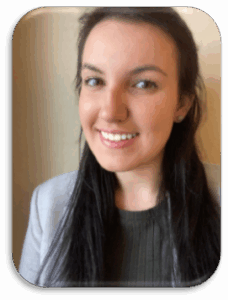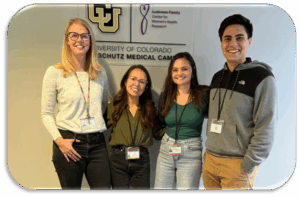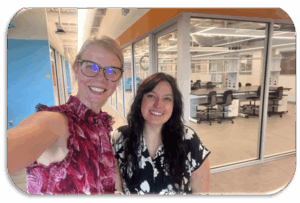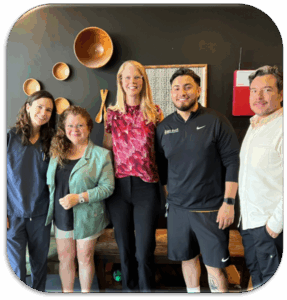Advancing Health Outcomes through Community Engagement and Optimization of Lifestyle Interventions
 Goal: Engage research partners at multiple levels (community member, provider, organizational leader) in the design and optimization of lifestyle interventions to improve sustained behavior change.
Goal: Engage research partners at multiple levels (community member, provider, organizational leader) in the design and optimization of lifestyle interventions to improve sustained behavior change.
Mission: Our mission is to help all individuals improve their health and wellbeing by changing their lifestyle habits (physical activity and nutrition) to prevent the many chronic diseases that are associated with unhealthy lifestyles such as obesity, cardiovascular disease, cancer, and Diabetes. We want to design and optimize interventions such that patients want to participate in them, providers can feasibly deliver them, and organizational leaders want to adopt them. We focus on designing for implementation and sustainability from the beginning.
State-of-the Art Research Lab Space: The Ostendorf lab is housed in the University of Tennessee’s Center for Precision Health (CPH), a state-of-the art, collaborative research facility located at UT Research Park at Cherokee Farm, 1600 Accelerator Way.
CURRENTLY RECRUITING A GRADUATE STUDENT! Dr. Ostendorf is currently recruiting one Graduate Assistant for the Fall 2026. Interested applicants should reach out to Dr. Ostendorf directly via email (dostendo@utk.edu).
Study Coordinators

Alex Manis, BS, University of Tennessee Knoxville

Chloe Simpson, BA, University of Colorado Anschutz Medical Campus

Cristina Rebellon, RD, University of Colorado Anschutz Medical Campus
Research Assistant(s)

Evan Griego, BS, University of Colorado Anschutz Medical Campus
Student Research Assistant(s)

Jessh Mavoungou, PhD Student, University of Tennessee Knoxville

Katie Smith, MS Student, University of Tennessee Knoxville

Payton Riddle, BS Student, University of Tennessee Knoxville
| Student Research Assistant | Year | Degree Program |
| Katie Smith | 2025-present | MS |
| Jessh Mavoungou | 2025-present | PhD |
| Payton Riddle | 2025-present | BS |


Center for Precision Health (CPH)
 The Ostendorf ActiveChange Laboratory is housed on the 3rd floor of the University Orthopedic Surgery Center within a new, state-of-the-art, collaborative research facility – The Center for Precision Health (CPH) – on the University of Tennessee’s Cherokee Farm Research Park. The CPH is a transdisciplinary research and innovation hub, comprising approximately 12,000 sq ft of space. The overarching concept of the Center is designed to encourage transdisciplinary interaction and collaboration, promote student and postdoc interactions, and generate an atmosphere of education, research, and outreach in the areas of health and medicine.
The Ostendorf ActiveChange Laboratory is housed on the 3rd floor of the University Orthopedic Surgery Center within a new, state-of-the-art, collaborative research facility – The Center for Precision Health (CPH) – on the University of Tennessee’s Cherokee Farm Research Park. The CPH is a transdisciplinary research and innovation hub, comprising approximately 12,000 sq ft of space. The overarching concept of the Center is designed to encourage transdisciplinary interaction and collaboration, promote student and postdoc interactions, and generate an atmosphere of education, research, and outreach in the areas of health and medicine.
In brief, the CPH houses:
- A private, data visualization room for testing Mobile Applications and conducting focus groups;
- Bench (wet-lab) space for 12 scientists;
- A cleanroom (e.g., good manufacturing practice) space for analytical and 3D-printing of biomaterials;
- Analytical instrumentation facilities, including liquid handling, microscopy, and centrifugation;
- Clinical (i.e., patient engagement) space for confidential patient interactions, including 4 private exam
- rooms and a phlebotomy space;

- Adjacent exercise physiology space (ca. 500 sq ft) for physical therapy, group exercise classes, and mobility evaluations;
- Adjacent office, interaction space, and conference rooms;
- Four general areas of practice are supported: clinical, computational, orthopedic innovation, and
- industry/entrepreneurial engagement;
- PI offices (16) are approximately 100 sq ft, located adjacent to the areas of practice;
- Office spaces and workstations for students and postdocs (up to 40, total) are located within the Center;
- High-capacity computing capabilities, data visualization, secure servers, and highspeed access to UT’s
- secure enclave;
- Numerous interaction spaces for collaboration and discussion.

Dr. Ostendorf’s office is located within the patient engagement and clinical space of the Center. The office for Dr. Ostendorf’s Research Assistant (RA), Alex Manis, is also located at CPH.
Equipment
Specific equipment available in the ActiveChange Laboratory includes:
- Activity monitoring: activPAL devices and physical activity questionnaires;
- -80ºC Freezer, Refrigerator (to store blood and stool samples);
- Stadiometer to assess height;
- Automatic blood pressure cuff to assess systolic and diastolic blood pressure;
- Steps, risers, and stopwatches to conduct the YMCA 3-minute step test;
- Participant research supplies (pregnancy tests, urine hats, gloves, etc.)
Graduate Students
The ActiveChange Laboratory is always looking for passionate, well-qualified graduate students interested in the design and optimization of physical activity interventions to prevent chronic diseases (Obesity, Diabetes, Cardiovascular Disease, Cancer). Specifically, the ActiveChange Laboratory concentrates on the use of community-engaged research methods and dissemination and implementation (D&I) science to guide the design of lifestyle interventions to prevent chronic diseases. The ActiveChange Laboratory applies several theories, models and frameworks to guide the conduct of rigorous science including, but not limited to:
- Multiphase Optimization Strategy (MOST) to guide optimization of interventions;
- Self-Determination Theory (SDT) to guide development of interventions to support autonomous motivation for behavior change
- Reach, Effectiveness, Adoption, Implementation and Maintenance (RE-AIM) to design with dissemination and implementation in mind from the beginning
Prospective graduate students may apply for a Master’s Degree or PhD in Kinesiology, with a concentration in Physical Activity Epidemiology. Inquiries about open positions are best directed to Dr. Danielle Ostendorf, the director of the ActiveChange Laboratory. Teaching and research assistantships are available for well-qualified students and the graduate curriculum can be adjusted to fit the goals, needs, and future career direction of the student.
Open Positions
Ostendorf ActiveChange Lab Graduate Assistant (GA) positions
- One Full Time GA: Ostendorf is currently recruiting up to one graduate assistant (GA) beginning Fall 2026. The GA role will come with a stipend and tuition and health benefits. Interested applicants should email Dr. Ostendorf directly.
Undergraduate Students
Undergraduate students interested in completing research within the field of physical activity epidemiology are advised to contact Dr. Danielle Ostendorf for information regarding research opportunities within the ActiveChange Laboratory. ActiveChange Laboratory requires undergraduate students to commit to at least one semester within the laboratory. However, longer commitments to the lab are favored.
Undergraduate students brought on as an assistant within the ActiveChange Laboratory will aid in ongoing research projects and are encouraged to develop their own research ideas. Students who engage in more than one semester of research are also encouraged to present the research in which they become involved at both internal and external research exhibits and professional conferences.
- Application of Dissemination & Implementation (D&I) Science and Human-Centered Design Testing to Develop Lifestyle Interventions: As an investigator trained in D&I methods, Dr. Ostendorf collaborates with several researchers to aid in the application of D&I models/theories/frameworks, D&I methods (including mixed methods), and community-engaged human-centered design testing to their grant proposals. Dr. Ostendorf is a graduate student of the University of Colorado Adult & Child Consortium for Health Outcomes Research & Delivery Science (ACCORDS) graduate certificate program in D&I, thus, has received rigorous training in D&I science. She has completed D&I courses in design for dissemination and sustainability (CLSC 6750), mixed methods (CLSC 6560), D&I grant writing (CLSC 6770), and advanced D&I research topics (CLSC 6850), among others. Dr. Ostendorf is passionate about designing and disseminating lifestyle interventions that not only help adults adopt healthy behaviors but sustain those behaviors long-term. She has published several manuscripts in this area and has also been invited to speak on this topic for national webinars.
- Sustained Physical Activity Adherence: Dr. Ostendorf’s passion for studying physical activity (PA) adherence began as a graduate student at the Indiana University of Pennsylvania, where she conducted her first, randomized controlled pilot study for her Master’s Thesis. This study was designed to examine whether the addition of a lifestyle intervention (behavioral and cognitive strategies) to personal training sessions improved exercise adherence and PA behavior over an 8-week period. Participants included 32 healthy adults who volunteered to receive personal training sessions from an exercise science undergraduate student. The results from this study support the use of specific intervention components such as goal setting and self-monitoring to improve exercise adherence. During her doctoral training, Dr. Ostendorf witnessed firsthand the struggle that participants experienced in maintaining the high levels of PA that are critical for long-term weight loss. This experience sparked her research interest in discovering ways to help adults adhere to our PA guidelines and reduce sitting, by focusing on psychosocial and behavioral aspects such as motivation and enjoyment. For her dissertation, Dr. Ostendorf wanted to understand how different motives for PA coexist within an individual using Self-Determination Theory (SDT). Using a latent profile analysis, she found that at baseline, both controlled motives (i.e. exercise for an external reward such as social recognition, or to avoid guilt) and autonomous motives (i.e. exercise is consistent with values or enjoyable) may help individuals achieve high levels of PA. However, after 6 months of a supervised exercise intervention, only autonomous motives were beneficial for sustaining high levels of PA long-term (12 months later). In addition, adults with high levels of intrinsic regulation achieved high levels of PA long-term, regardless of their levels of the other types of motivation. These data demonstrate the need to design PA interventions that focus on eliciting intrinsically motivating goals.
- Novel Behavioral Weight Loss Interventions Targeting Reducing Energy Intake and Increasing Physical Activity: Ostendorf received extensive, direct training in implementing large (n = 150-170), randomized, novel, interventional weight loss trials (R01 DK097266, R01 DK111622) through predoctoral and postdoctoral training with Dr. Vicotria Catenacci at the University of Colorado. R01 DK097266 was an 18-month randomized trial designed to determine the optimal time to begin exercise within a comprehensive, behavioral weight loss program. Dr. Ostendorf has several publications in this area of research.
Highlighted Research Funding:
| Title and Grant # | Major Goals | Name of PI | Source of Support | Total Award Amount | Links |
| Designing with Dissemination in Mind: Development and Evaluation of a Theory-Based Physical Activity Intervention using the Multiphase Optimization Strategy
K01 HL161417 |
The overall objective of this K01 Career Development Award is to refine and pilot test a theory-based, multilevel physical activity support program (called Move+) designed to enhance motivation in adults with overweight or obesity enrolled in a lifestyle weight management program. | Danielle Ostendorf, PhD | NIH, National Heart, Lung, and Blood Institute (NHLBI) | $830,923 | Clincialtrials.gov page and NIH Reporter Page |
| Movámonos: Translation and Cultural Adaptation of a Theory-Based Physical Activity Support Program for Spanish-Speaking Adults | The overall objective is to translate and culturally adapt an existing physical activity (PA) support program called Move, to create Movamonos (translates to “Let’s move”) by engaging Spanish-speaking co-designers (Aim 1) and then pilot test Movamonos in a single-arm field trial (Aim 2). Consistent with Designing for Dissemination and Sustainability (D4DS) and Equity methods, two frameworks will be integrated to guide the approach: 1) the Multiphase Optimization Strategy (MOST), and 2) the Practical Robust Implementation and Sustainability Model (PRISM). | Danielle Ostendorf, PhD | Colorado Nutrition Obesity Research Center (NORC) Pilot | $40,000 | |
| Evaluating Health Outcomes of AI-Based Fitness Wearables and App Programs in Older Adults Living Alone with Cognitive Decline | Zan Gao, PhD (Dr. Ostendorf’s Role: Co-I) | Arizona State University (ASU) Roybal Center | $150,000 | ||
| Novel dietary interventions for reducing obesity-associated breast cancer
R01 CA258766 |
This work will establish whether a subtype of cancer-associated fibroblasts (pCAF) are a novel mechanism by which obesity enhances the survival, growth, and progression of breast cancer and establish whether this mediator is modifiable by the highly novel dietary interventions of intermittent energy restriction induced weight loss. | Paul MacLean, Phd; Victoria Catenacci, MD; Peter Kabos, MD) (Dr. Ostendorf’s Role: Co-I) | NIH, National Cancer Institute (NCI) | $3,166,683.00 | NIH Reporter |
| Peer Coaching for Physical Activity Promotion among Breast Cancer Survivors: Adapting an Efficacious Intervention to Prepare for Implementation
R01 CA242745 |
The purpose of the study is to prepare to scale up Moving Forward Together (MFT) by adapting a validated web platform (Mentor1to1™). After the adaptation of Mentor1to1TM (thereby creating webMFT), we will use a randomized controlled design to test the intervention (webMFT vs. MVAP tracking) and use mixed method approaches to collect data at the level of coach, survivor, and organization to position our team for a subsequent large-scale pragmatic implementation trial. | Bernardine Pinto, PhD (Dr. Ostendorf’s Role: Site PI and Consultant) | NIH, National Cancer Institute (NCI) | $4,012,488 | NIH Reporter |
| Measuring co-creation during the engagement process in research: A pathway forward | This proposal will develop a pragmatic measure to assess the co-creation process, which is a critical process in stakeholder engagement. The measure will be based on a conceptual model of co-creation and prior work by the study team to define the domains of co-creation and specific activities that support each domain. | Monica Perez-Jolles, PhD (Dr. Ostendorf’s Role: Co-I and Consultant) | Patient-Centered Outcomes Research Institute (PCORI) | $710,000 | |
| Effects of allowing choice of dietary regimen within an intensive lifestyle intervention among adults with prediabetes living in rural communities: a pilot and feasibility study ADA 7-22-JDFN-24 |
The specific aims of this study are to: 1) Engage stakeholders at multiple levels to guide the design of a 16-week PreventT2 + Choice intervention in adults with prediabetes living in rural communities; and 2) Assess the feasibility and acceptability of PreventT2 + Choice intervention. | Elizabeth Thomas, MD (Dr. Ostendorf’s Role: Co-I and Consultant) | American Diabetes Association (ADA) | $295,176 |

Complete List of Published Work:
https://www.ncbi.nlm.nih.gov/myncbi/1zMbY_sMhYpQ7/bibliography/public/
Featured Publications:
- Catenacci VA*, Ostendorf DM*, Pan Z, Grau L, Creasy SA, Zaman A, Caldwell AE, Dahle J, Swanson B, Breit MJ, Bing K, Wayland LT, Panter, S, Scorsone JJ, Bessesen DH, MacLean P, and Melanson EL (2025). The Effect of 4:3 Intermittent Fasting on Weight Loss at 12 Months: A Randomized Clinical Trial; Ann Intern Med. 2025 Apr 1; [e-pub]. doi: 7326/ANNALS-24-01631.
- Ostendorf DM*, Huebschmann AG*, Kindred M, Wickersham K, and Pinto BM (2025). Adopting and implementing an efficacious peer-delivered physical activity program for web platform delivery in survivors of cancer: Organizational readiness and perspectives. Transl Behav Med. 2025 Jan 16;15(1):ibaf051. doi: 10.1093/tbm/ibaf051. PMID: 41005365.
- Ostendorf DM, Schmiege SJ, Conroy DE, Phelan S, Bryan AD, Catenacci VA. Motivational profiles and change in physical activity during a weight loss intervention: A secondary data analysis. Int J Behav Nutr and Phys Act. 2021;18(1):158. DOI: 1186/s12966-021-01225-5.
- Pinto BM, Kindred M, Dunsiger S, Mitchell S, Patel A, Ostendorf DM, and Huebschmann AG. Effects of web platform delivery of a physical activity program for breast cancer survivors: A randomized controlled trial. Journal of Cancer Survivorship. J Cancer Surviv (2025). https://link.springer.com/article/10.1007/s11764-025-01811-7
- Perez Jolles M, Willging, C, Tufte, J, Ostendorf DM, Kwan BM, Sevick C, Holliman D, and Weiner B (2024). Development and validation of a pragmatic measure of co-creation in research engagement: A study protocol. BMJ Open;14:e091966. doi: 1136/bmjopen-2024-091966.
- Catenacci VA*, Ostendorf DM*, Pan Z, Bing K, Wayland LT, Seyoum E, Stauffer BL, Phelan S, Creasy SA, Caldwell AE, Wyatt HR, Bessesen DH, and Melanson EL. (2019). The Impact of Timing of Exercise Initiation on Weight Loss: An 18-Month Randomized Clinical Trial. Obesity. 00(0):1-11. PubMed PMID: 31565869. *These authors contributed equally to this work.
- Ostendorf DM*, Caldwell AE*, Zaman A, Pan Z, Bing K, Wayland LT, Creasy SA, Bessesen DH, MacLean P, Melanson EL, and Catenacci VA (2022). Comparison of weight loss induced by Daily Caloric Restriction versus Intermittent Fasting (DRIFT) in individuals with obesity: Study protocol for a 12-month randomized clinical trial. Trials 23, 718. https://trialsjournal.biomedcentral.com/articles/10.1186/s13063-022-06523-2; *These authors contributed equally to this work.
- Ostendorf DM, Blankenship J, Grau L, Arbet J, Mitchell N, Creasy S, Caldwell A, Melanson E, Phelan S, Bessesen D, Catenacci V. (2021). Predictors of long-term weight loss trajectories during a behavioral weight loss intervention: An exploratory analysis. Obesity Science & Practice. DOI: 1002/osp4.530. *These authors contributed equally to this work.
- Ostendorf DM, Lyden K, Pan Z, Wyatt HR, Hill JO, Melanson EL, and Catenacci VA. (2018). Objectively measured physical activity and sedentary behavior in successful weight loss maintainers. Obesity. Jan;26(1):53-60. PubMed PMID: 29090513.
Featured News Articles:
- https://www.cbsnews.com/video/can-intermittent-fasting-help-you-lose-more-weight-heres-what-a-new-study-says/
- https://www.healio.com/endocrinology/obesity/news/online/%7B301bf3da-43d4-4c35-a1f5-d93a3dfb0ecf%7D/baseline-fitness-level-may-predict-future-weight-loss-success
- https://coach.nine.com.au/2019/04/09/11/57/diet-exercise-physical-activity-weight-loss-maintenance
Contact Us
Danielle Ostendorf, PhD
Assistant Professor, Physical Activity Epidemiology
Department of Kinesiology, Recreation, and Sports Studies
College of Education, Health, and Human Sciences
University of Tennessee Knoxville
Address: Center for Precision Health, CPH 393
1600 Accelerator Way, Suite 300
Knoxville, TN 37920
Phone: 865-974-8606
Email: dostendo@utk.edu